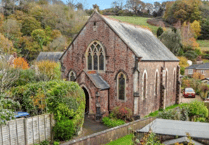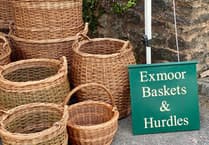WINSFORD is back in the political news again. Boris Johnson, who was brought up in what many believe is the prettiest village on Exmoor, is once again battling for his future, while his father, Stanley, no stranger to controversy, is still awaiting a decision about a knighthood.
Strangely, Winsford’s most dazzling political star has long since faded from the headlines. Indeed the recent 70th anniversary of the death of the man described as “Labour’s Winston Churchill” went virtually without comment.
And when four customers in the village shop were asked if they knew who Ernest Bevin was, only one had the answer. In fact they were standing a stone’s throw from the house where he was born and his name is carved on a plaque on the wall.
The man who rose from being an Exmoor orphan farm-labourer to become a world-shaping statesman - buried in Westminster Abbey - never forgot his life of abject poverty on Exmoor, which he described as “a form of slavery”. He remembered being thrashed for not cutting turnips quickly enough.
Churchill and Attlee are recognised as giants of mid-20th century British politics and Nye Bevin is remembered as the founder of the NHS. But for some reason, Ernest Bevin, whose remarkable rise to fame and power is probably unmatched by any leader to this day, is often overlooked.
The fact that he has been largely forgotten would bewilder past generations who regarded Bevin as a towering political figure in war and peace, a trades union tour de force and a “working class John Bull,” as Churchill put it, who allowed no-one, including Stalin, to push him around.
Bevin was foreign secretary from 1945 to a few weeks before his death in 1951. “When I joined the Foreign Office in 1956 I was told by my predominantly public school seniors, that Ernie Bevin was the most loved foreign secretary they had known,” remembers Sir Roger Carrick, a distinguished ambassador now living in retirement at Wootton Courtenay. “He was Labour’s Churchill!”
The house in which Ernest Bevin was born in 1881 is larger than one might have expected, slightly forbidding and a weather-beaten grey colour. Being Bevin’s birthplace has brought grade two listed building status.
His upbringing reads like a dark chapter in a Thomas Hardy novel. His mother, Mercy, also known as Diana, whose photograph he kept on his desk all his life, died of cancer when he was eight.
She had married an agricultural worker named William Bevin in 1864 but he deserted the family in 1867 and from then on Mercy called herself a widow. Ernest was one of seven children and it is not certain who his father was.
Mercy struggled to feed and clothe her children, doing domestic work and serving as the village midwife. Bevin would say later that no-one deserved such a hard life and that he could never repay the debt of gratitude he owed her.
The trauma caused to young Ernest on his mother’s death was compounded when the local vicar refused to allow the coffin into the church on the grounds that she was Methodist. He only conceded after threats from parishioners.
The family home was broken up, the furniture sold and Ernest went to live with his half-sister Mary and her husband George Pope. He would remember being the only member of the family who could read, and in the evening would read aloud from the newspaper.
He left school at 11 and found a job on a farm, working ten hours a day for sixpence a week, stone-picking, and driving and feeding cattle.
The Winsford village postman, who described Bevin as “pale-looking and bullied,” remembered seeing the boy filling buckets from a stream in deepest winter. “The water was ice-cold and his hands were all covered with broken chilblains.”
At 13, Ernest left the farm, persuaded by his brothers, Jack and Albert to join them in Bristol. He worked in a bake-house, a restaurant and as a van boy, horse-tram conductor and delivery driver for a ginger beer company.
He never lost his Exmoor accent and never hid his humble beginnings: many years later as Foreign Secretary, when told that his principle private secretary’s wife came from Bristol, he replied: “Ah yes, I know the house. I used to deliver the laundry.”
He had by now married to Florence Townley, the daughter of a Bristol wine-taster, and felt it was time for further self-improvement. He attended evening classes in politics and economics.
“They helped me see where I was going,” he said, and as a result became assistant general secretary of the Dockers’ Union before playing a major role in forming the Transport and General Workers’ Union.
By the late 1930s, Bevin was general secretary of the largest union in the country and was top of the list of Labour figures Churchill wanted for his war cabinet. He became an MP for the first time in 1940 at the age of 59 and served as Minister of Labour and National Service in the coalition government.
After the 1945 general election, Bevin became Foreign Secretary and his record speaks for itself. He allied the UK to the US in the Cold War, was a key figure in the formation of NATO and the development of Britain’s independent nuclear deterrent.
Sir Roger recalls Ernie’s characteristic reaction. “He said: ‘We’ve got to have this thing over here whatever it costs… we’ve got to have the bloody Union Jack on top of it!’”
Ernest Bevin died after a massive heart attack in April 1951 while he was working on official papers, the key to his ministerial red box clasped in his hand.
He was 70 and never forgot where he had come from. Once asked by King George VI where he had gained all his knowledge of the world, Bevin replied: “From the hedgerows of experience.”
Maybe the deep lanes of Winsford can take a little of the credit for that.





Comments
This article has no comments yet. Be the first to leave a comment.